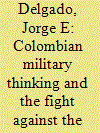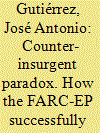|
|
|
Sort Order |
|
|
|
Items / Page
|
|
|
|
|
|
|
| Srl | Item |
| 1 |
ID:
141152


|
|
|
|
|
| Summary/Abstract |
This article attempts to place in historical perspective the latest effort by Colombia’s military (Colmil) to defeat the now half century old insurgency of the Fuerzas Armadas Revolucionarias de Colombia – Ejército del Pueblo (FARC-EP). It argues that the ‘surge’ initiated under President Álvaro Uribe in 2002 with the assistance of the United States can only be fully analyzed in the context of the Colmil’s intellectual framework for counter-insurgency. Specifically, this article will explain how the protracted engagement with counter-insurgency has shaped the Colmil’s understanding of the nature of the conflict, as well as its attitudes towards its adversary, civil authority and the instrumentality of force. An understanding of the Colmil’s strategic tradition can also help to explain their apprehensions about the ongoing peace negotiations with the FARC-EP.
|
|
|
|
|
|
|
|
|
|
|
|
|
|
|
|
| 2 |
ID:
177675


|
|
|
|
|
| Summary/Abstract |
Institutions are historical products shaped by power and contestation which don’t necessarily respond to the purpose for which they were originally created. I will explore how ‘communal action’ institutions created to contain the advancement of the insurgent movement in rural Colombia in the 1950s were eventually used by guerrillas, notably the FARC-EP. Through them, rebels advanced their political agenda, reinforcing their organisational work in rural communities. The strategic impact of this contradictory process, cannot be over-stated, for it turned the struggle of rebels against the State into a struggle fought squarely within the very structures of the State they antagonised.
|
|
|
|
|
|
|
|
|
|
|
|
|
|
|
|
| 3 |
ID:
193068


|
|
|
|
|
| Summary/Abstract |
Everything that comes in, eventually goes out. One way or another. This paper will look into eating and defecating practices among rebels in Colombia, in particular, the FARC-EP. I will argue that these practices, despite being daily occurrences, have been overlooked in conflict studies. I will argue that eating practices in particular reinforced emotional bonds within the organization and fostered micro-solidarity. At the same time, eating and defecating practices reflected and reinforced, at once, organizational practices and ideological commitments of the rebels – particularly gender equality and collectivism. This paper, by focusing on cherished everyday activities which are deeply human, both biological and social, is a call to re-humanise this field of study.
|
|
|
|
|
|
|
|
|
|
|
|
|
|
|
|
| 4 |
ID:
179834


|
|
|
|
|
| Summary/Abstract |
According to the ‘rebels-turned-narcos’ premise, increasing involvement in the illicit drug industry causes insurgent groups to lose sight of their political aims, as they shift their focus to profit-making. The (former) Colombian rebel group, the FARC-EP, became a paragon for this idea. Drawing on primary research, we argue that the FARC-EP’s involvement in the illicit drug economy was itself political. Their involvement included governance activities, which are by their very nature political. Furthermore, these activities formed part of the FARC-EP’s political project, aimed at ensuring the reproduction of the peasant smallholder economy. Our argument challenges the rebels-turned-narcos premise more broadly by showing why involvement in the illicit drug economy, on its own, is insufficient evidence to posit the depoliticization of an insurgent group.
|
|
|
|
|
|
|
|
|
|
|
|
|
|
|
|
| 5 |
ID:
190859


|
|
|
|
|
| Summary/Abstract |
Academic perspectives on women in conflict have been consistently moving away from the reductionist narrative of victimhood or deviation from gender norms. Yet, this narrative is still predominant in humanitarian discourses, while it is assumed that women’s participation in peacebuilding derives from their natural proclivities. These narratives, we argue, reinforce the gendered patriarchal post-conflict order as ex-combatant women are pushed into traditional roles through reintegration processes without addressing gendered structural and systemic violence. This article is based on the Colombian case, where a peace agreement in 2016 marked the official end to decades of conflict between FARC-EP rebels and the government. While deep changes were promised, the reality for women ex-combatants has been – despite unprecedented levels of women’s participation – a reordering into traditional roles and a reinforcement of conjugal order rather than a transformative progression towards peacetime emancipation. We argue that, while the government claimed that the economic and political systems were non-negotiable red-lines, there was also another unspoken red-line: that of gender roles. This article argues that addressing the gendered structural roots of conflicts in order to build sustainable peace requires a decisive participation of women, including former rebel combatants whose potential contribution to transformative peacebuilding are often ignored.
|
|
|
|
|
|
|
|
|
|
|
|
|
|
|
|
|
|
|
|
|